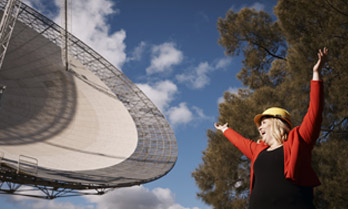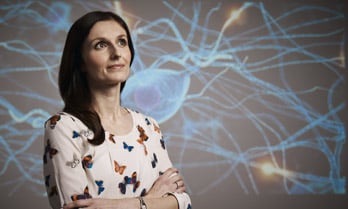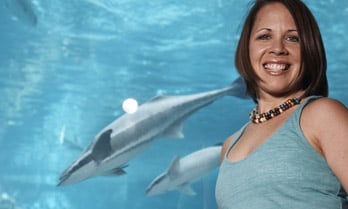Dr Muireann Irish, cognitive neuroscientist, Neuroscience Research Australia/UNSW, Sydney
08 September 2015
How we imagine the future
Dr Muireann Irish has discovered which parts of our brain are essential to imagine the future, ranging from simple things like “I must remember my keys and my wallet when I go out,” to imagining complex events such as “my next holiday”. And she has shown that people with dementia don’t just lose the ability to remember the past, they also lose the ability to envisage the future.
She will use her L’Oréal-UNESCO For Women in Science Fellowship to better understand how dementia affects this cognitive function. She expects her work will inform the development of activities for patients that will improve their quality of life and reduce the burden faced by caregivers.
Cognitive decline in the form of dementia will be one of the greatest challenges for our health system in the next fifty years and Muireann is leading the search for solutions.
Qualifications
| 2008 | PhD (Psychology), Trinity College Dublin, Ireland |
| 2007 | Graduate Diploma in Statistics (Distinction), Trinity College Dublin, Ireland |
| 2003 | Bachelor of Psychology (1st Class Honours), Trinity College Dublin, Ireland |
Career highlights, awards, fellowships, grants
| 2015 | Keynote speaker, Frontotemporal Dementia Conference Up Close and Personal, Coffs Harbour, NSW |
| 2015 | Elected as a member of the international Memory Disorders Research Society |
| 2015 | ARC Centre of Excellence in Cognition and its Disorders, Cross Program Support Scheme grants (also received in 2012, 2013, and 2014) |
| 2015 | Invited presentation, International Neuropsychological Society annual meeting, Denver, Colorado, USA |
| 2015 | UNSW Faculty of Science Dean’s Carers Fellowship |
| 2014 | NSW Young Tall Poppy Science Award, Australian Institute for Policy and Science |
| 2014 | Invited presentation, Australian Psychological Society College of Clinical Neuropsychologists annual general meeting |
| 2014 | CASS Foundation travel award to attend International Society for Behavioral Neuroscience annual meeting, Hawaii, USA |
| 2014 | Invited panellist, Sydney Biennale |
| 2014 | Study visit, International Conference on Frontotemporal Dementia and invited presentation at the University of British Columbia, Vancouver, Canada |
| 2013–2016 | ARC Discovery Early Career Researcher Award (DECRA), Back to the future–dissociating mental simulation processes in the brain |
| 2013 | Dean’s Award for National Achievements in Research, Faculty of Science, University of New South Wales |
| 2013 | Paxinos Prize awarded for best Postdoctoral Research Paper at Neuroscience Research Australia |
| 2013 | Conference and collaborative visit to Europe, International Neuropsychological Society annual meeting in Amsterdam, Netherlands and invited presentation at Trinity College Institute of Neuroscience, Dublin, Ireland |
| 2013 | Laird Cermak Award for Outstanding Research in Memory, International Neuropsychological Society annual meeting, Hawaii, USA |
| 2013 | Outstanding Presentation by an Early Career Researcher, International Neuropsychological Society annual meeting, Hawaii, USA |
| 2012 | Ian Potter Foundation travel award to attend International Neuropsychological Society meeting, Hawaii, USA |
| 2012 | Nominated and elected into member-only International Society for Behavioural Neuroscience. Invited presentation and elected faculty member, San Francisco, USA |
| 2012 | Study visit and invited presentations at Harvard University, and VA Boston Healthcare, Boston, USA |
| 2011 | Dean’s Rising Star Award, Faculty of Medicine, University of New South Wales |
| 2011 | Alzheimer’s Australia Dementia Research Foundation Project Grant |
Top five publications
Irish M, Addis DR, Hodges JR, Piguet O (2012) Considering the role of semantic memory in episodic future thinking: evidence from semantic dementia, Brain 135(7): 2178–2191. (Impact factor 9.196, 78 citations)
Irish M, Piguet O, Hodges JR (2012) Self-projection and the default network in frontotemporal dementia,Nature Reviews Neurology 8(3): 152–161. (Impact factor 15.358, 38 citations)
Irish M, Lawlor BA, O’Mara SM, Coen RF (2011) Impaired capacity for autonoetic reliving during autobiographical event recall in mild Alzheimer’s disease, Cortex 47(2): 236–249. (Impact factor 5.128, 50 citations)
Irish M, Piguet O, Hodges JR, Hornberger M. (2014) Common and unique gray matter correlates of episodic memory dysfunction in frontotemporal dementia and Alzheimer’s disease, Human Brain Mapping 35(4): 1422–1435. (Impact factor 5.969, 25 citations)
Irish M, Hodges JR, Piguet O (2014) Right anterior temporal lobe dysfunction underlies theory of mind impairments in semantic dementia, Brain 137(4): 1241–1253. (Impact factor 9.196, 14 citations)




